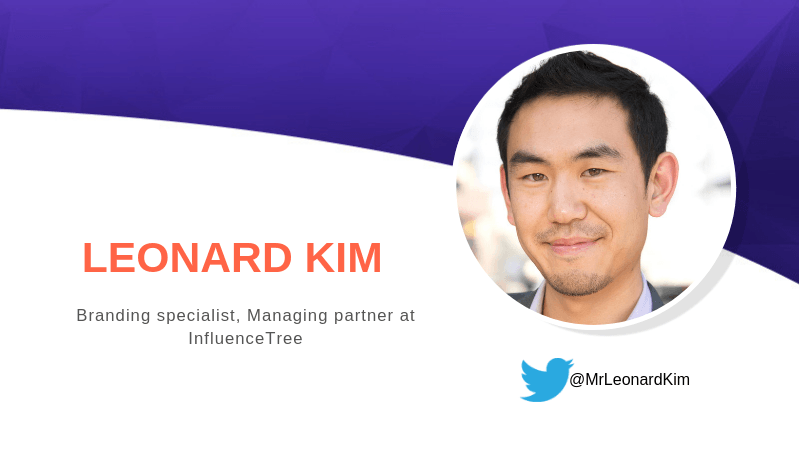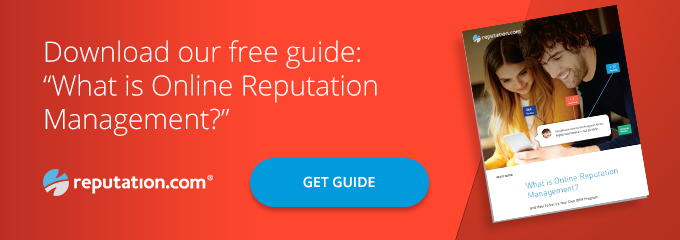A Q&A with Leonard Kim on Branding, Online Reputation and Authenticity
Reputation Staff Writer


Leonard Kim, branding specialist, managing partner at InfluenceTree and author of “Ditch the Act: Reveal the Surprising Power of the Real You for Greater Success” did not get to the top of his field by using connections or money. He made it there by taking risks and failing, until one day he succeeded. Read on for some valuable lessons in branding, online reputation, authenticity and failure.
You’re a branding specialist who stresses the importance of being open, honest and real in order to gain a following and differentiate yourself. For instance, you like to incorporate your rags-to-riches story in your writing and your interviews — is this the kind of compelling story that has contributed to your success? Do you recommend others follow suit with their own stories?
It’s really owning your whole self, and that includes the good, the bad and your version of the ugly.
Some people have had lots of ups and downs, while others might have had more of a traditional life where they went to school, got good grades, didn’t have any hardships, etc. There’s nothing that really distinguishes and makes one person more fascinating than another. For this reason, a lot of people overlook the details and think they’re not important, that they won’t create a connection. But we need to highlight those things and bring them out. This way, we’re able to create a compelling personal brand, because what people are looking to find those connection points.
For instance, during a recent phone call I had, the woman I was talking to mentioned how her first job was at Safeway bagging groceries, and I felt an instant affinity towards her because my first job was bag groceries at Albertsons.
The more similarity I see in you, the easier it is for me to be able to connect with you on a human level, which builds trust, camaraderie, candor. It builds up relationships and makes operations a little smoother. And if you’re a salesperson, that can help you increase sales. If you’re a business development person, it can help you build relationships. If you’re a marketer, it can help you connect and build a message that will connect with your audience. If you’re a manager, it can help you connect with your employees.
Should you share stories about yourself that don’t portray you in a good light as well, or only positive stories?
I think most people’s natural instinct, when it comes to bad things or things that may have gone wrong in life, is to cover them up. But it’s not always the best choice. While you might not want to put stories about your shortcomings front and center in your bio, share them somewhere, so if someone tries to call you out on them, they can’t be held against you.
Taking ownership of the things you’ve done instead of trying to bury them creates this armor around you where you develop immunity to attacks from others.
Can you talk a little bit about this inasmuch as it relates to your online reputation? Your online reputation is often thought of as your reviews, but it is so much more. How do you control it and make it work for you rather than against you?
When it comes to online reputation management, you can either, one, control your narrative, or two, let others control it for you.
As a business owner, the best thing you can do is take ownership of your reputation. The second most important thing is controlling the narrative. If someone writes about you in a negative way, you have to take ownership of the narrative. You have to create a bio for yourself. The most important thing you’re ever going to have online is that bio. It will tell who you are, what you did, how you were raised, what you were like and how you got to where you are today.
When you have that story out there, a lot of people will get to know you. And people do business with people they know, like and trust. The same goes for businesses. The more details that you have in that bio, the easier it is for people to know, like and trust you.
From there, it’s important to understand you can always counteract negativity with content marketing, whether that’s videos, articles or podcasts. The more stuff you have out there that you’re taking ownership of, the easier it is for you to maintain that narrative of yourself as opposed to handing it off to others.
That sounds like a full-time job. Should people hire a publicist or marketer to help?
If you’re not good at managing your reputation, you should look for other outlets and other partners who could potentially help.
Most people are usually good at two to three things. For a restaurant owner, that might be cooking, management and customer service. But when it comes to marketing or branding yourself or working on your reputation, that might not be in your skillset. But you have to see how important it is, because a business is not going to be able to survive without a strong reputation.
Especially for a brand-new business, reputation becomes as important as anything else, and you have to factor in the two different sides of your reputation. One is you as the owner of the business, and two is the business itself.
You have been the social media specialist at Keck Medicine for several years and have increased the number of followers by more than 20X. What is the secret to getting more followers? What should you post and how often should you do it?
Focus on making content that might relate to others. If you lead with content, chances are you’ll elevate your social media following and get people sharing that content. You’ll land media features.
Most people write 500-word articles or 1-to-2-minute videos. People think, “This is OK, but it really didn’t speak to me, it really didn’t touch me.”
Twenty percent of content creators work on blockbuster content. Creating content like this takes a lot of time, but when people read it or watch it, they’re like, “Wow, I actually felt like I took something away from this. I wonder who the author of this article is. I wonder what company is producing this.”
They’ll want to learn more about the people who are in charge of it, and if you have a strong bio or company values, they’re going to think, “Wow, this person/business seems pretty relatable.”
They’ll want to either connect with you on a call, follow you on social media, do a media feature on you or maybe even become a customer.
Tell us about your book coming out this fall.
My book, Ditch the Act: Reveal the Surprising Power of the Real You for Greater Success, outlines why we need to go out there and reveal our whole selves. Most of us, unconsciously, are wearing multiple masks. We’re given all these different roles, and we kind of forget who we truly are.
It could be the reason we’re not able to connect to people on a deeper level. What Ditch the Act does is help you go out there and own your whole self. Connect and build camaraderie with others, try new things with your business, propel your career and be successful.
______________________________
Reputation.com helps companies improve their online brands and increase positive customer feedback. Download our Turn Your Customers Into Brand Champions Guide to learn more.



